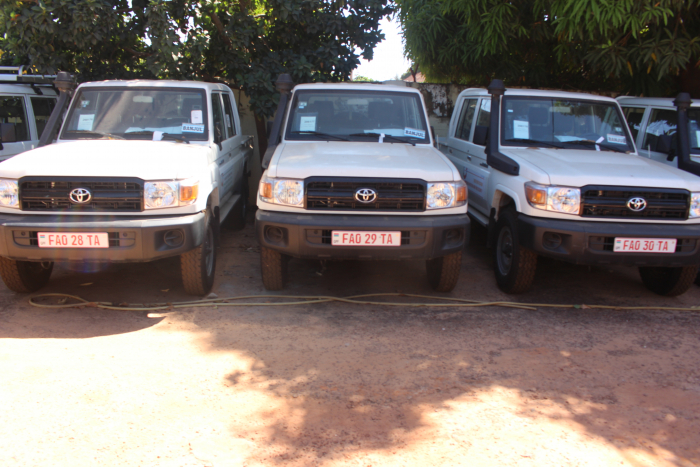
The support is within the European Union (EU) funded projects “Improving Food Security and Nutrition in the Gambia through Food Fortification” and “Agriculture for Economic Growth Food Security/Nutrition to mitigate migration flows”.
Implementation of the projects with the Ministry of Agriculture and the Ministry of Health started in 2017 to support the attainment of Vision 2020 and the National Development Plan 2018-2021.Achieving Zero Hunger - Sustainable Development Goal 2 (SDG2) and Agenda 2030 is addressed by FAO’s mandate with the support and funding from European Union contributing to the Government of the Gambia’s objectives to improve livelihoods, and guarantee food and nutrition security.
Agriculture Minister Amie Fabureh will preside over the brief handing over ceremony at the Quadrangle in Banjul. The materials will facilitate the work of the recipient institutions in the fight against food insecurity, malnutrition and rural poverty in The Gambia. The beneficiaries are the Regional Agricultural Directorates in Kerewan (NBR) and Kuntaur (CRR North), Agri-Business services (ABS), National Agricultural Research Institute (NARI) and the Directorate of Health Promotion and Education of the Ministry of Health.
- The Regional Agricultural Directorate in Kerewan (NBR) will receive 1 Toyota Pickup; 1 Laptop and 1 printer whilst the Regional Agricultural Directorate in Kuntaur (CRR North) will get 1 laptop and 1 printer to facilitate the piloting of the newly formulated Gambia Agriculture Extension Policy in the two ecological sites (NBR and CRRN).
- The Agri-Business services (ABS) under the Ministry of Agriculture will receive 1 Toyota Pickup, 2 Laptops and 1 printer for the implementation of the newly formulated Gambia National Cooperative Policy.
- The National Agricultural Research Institute (NARI) Breeding Laboratories are currently being rehabilitated by FAO. NARI will receive 4 laptops and 1 printer to support NARI Young scientists in the different breeding teams.
- The Directorate of Health Promotion and Education of the Ministry of Health will receive a Toyota Pickup to sensitize communities on consumption of micronutrient rich and fortified foods.
FAO’s Food Fortification Project improves the food and nutrition security of vulnerable women and children. It focuses on ensuring access to and consumption of micronutrient rich foods, industrially fortified as well as bio-fortified food with adaptive strategies for promoting better nutrition outcomes. This integrated initiative will reinforce the regulatory systems and public private partnerships on food fortification. Furthermore, it will contribute to increasing the awareness, knowledge and skills required for the production, conservation and consumption of diverse food by project beneficiaries. The expected results of the project will reinforce the regulatory framework for food fortification and raise the level of awareness of and access to fortified and bio fortified food to about 65% of Gambia’s population. Public and private institutions will be encouraged to support food fortification.
The support material will address establishing and maintaining an effective agricultural extension service. With this support, the recently finalised Agriculture Extension Policy market reforms, it is realistic and responsive to the dynamics in the agricultural sector in The Gambia. Hence, the importance of the equipment support to modernise agriculture and for digital work innovation.
The importance of extension policies was recognised by the FAO's Global Consultation on Agricultural Extension when it recommended that "all national governments should develop and periodically review their agricultural extension policy. This policy should include the goals of agricultural extension, the responsible agencies and personnel, the clientele to be served, the broad programmatic areas to be addressed, and other relevant guidelines." The consultation further recommended, that “FAO in cooperation with the donor community, should engage in policy dialogue with national governments to stress the importance of agricultural extension in agricultural development and the need to have an explicit, formally enacted, agricultural extension policy."





